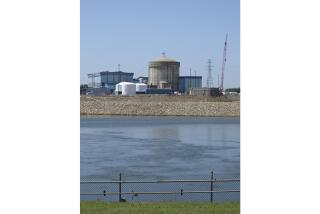Official Calls Tritium Supply Stretchable
- Share via
WASHINGTON — Failure to restart tritium gas production this year at the government’s Savannah River, S. C., weapons plant eventually could impair the nation’s nuclear arsenal, a top Energy Department official said Thursday. But his testimony suggested that the problem is less immediate than some officials had indicated earlier.
Troy E. Wade II, the acting assistant secretary for defense programs, told the Senate Armed Services Committee that the need to restart Savannah River’s three trouble-plagued reactors, which are the government’s only source of tritium, “is becoming critical.”
But he said that the Energy Department will be able to stretch existing supplies of the gas at least to the end of 1989. Some officials had warned last year that a tritium shortage could occur as early as this summer--and could force the cannibalizing of some nuclear weapons to keep others working.
Wade, picking his words carefully, partly to avoid disclosing classified information about U.S. nuclear weapons production, said that, “if a reactor is not restarted this year, then the supply of tritium could be reduced to such an extent that the nuclear stockpile may be affected.”
He did not say, however, what effect such a tritium shortage would have on the weapons stockpile, which is believed to consist of about 22,000 missile warheads, gravity bombs and other munitions, such as artillery shells.
Could Retire Weapons
Independent experts have said that the government has a variety of options. They include accelerating retirement of older weapons, delaying production of new weapons and giving existing warheads only a partial recharge of the gas, enough to last two to three years.
Tritium, a radioactive form of hydrogen gas, is used to boost the power of nuclear weapons. Because it decays into helium at a rate of about 12% a year, it must be replenished every four to five years to maintain a weapon at full strength.
All three Savannah River production reactors were shut down last spring and summer amid growing concern about their deteriorating conditions; all are over 30 years old. There was also concern about the outdated, often slipshod safety practices of the plant’s longtime operating contractor, E. I. du Pont de Nemours & Co.
Westinghouse Corp. is to assume management of the plant in April.
Wade told the Senate committee that, despite continuing management problems at the plant, he believes it will be possible to restart one reactor by October. But the Energy Department’s chief safety official, Richard Starostecki, was less optimistic.
“I am a skeptic,” Starostecki said in response to a question by Sen. Albert Gore Jr. (D-Tenn.) about the likelihood of meeting that deadline. “From a skeptic’s point of view, a lot of things have to happen (at Savannah River), and they are not happening,” Starostecki said.
Gore asked if this meant that reviving one of the plant’s reactors this year is “not likely,” and Starostecki replied that, “based on performance to date, that’s true.”
More Problems Found
His pessimism was echoed by John Ahearne, chairman of a committee of outside technical advisers monitoring safety issues at the plant. “We are uncertain as to whether all technical problems (at Savannah River) have been identified,” Ahearne said. “The closer we look, the more problems we find.”
More to Read
Sign up for Essential California
The most important California stories and recommendations in your inbox every morning.
You may occasionally receive promotional content from the Los Angeles Times.













